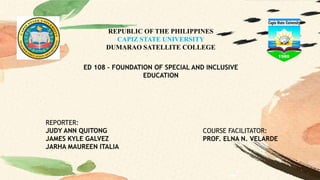local_media7091492881283460429.pptx
•Als PPTX, PDF herunterladen•
0 gefällt mir•8 views
Education
Melden
Teilen
Melden
Teilen

Empfohlen
Empfohlen
Weitere ähnliche Inhalte
Ähnlich wie local_media7091492881283460429.pptx
Ähnlich wie local_media7091492881283460429.pptx (20)
EDUC 1002 Pioneers and Philosophies of Education Week 4 .docx

EDUC 1002 Pioneers and Philosophies of Education Week 4 .docx
Piaget's cognitive development stages and maslow's hierarchy of needs

Piaget's cognitive development stages and maslow's hierarchy of needs
Piaget's cognitive development stages and maslow's hierarchy of needs

Piaget's cognitive development stages and maslow's hierarchy of needs
PIAGET THEORY OF INTELLECTUAL DEVELOPMENT PPT.pptx

PIAGET THEORY OF INTELLECTUAL DEVELOPMENT PPT.pptx
Mehr von AnnaRicaSicang
Mehr von AnnaRicaSicang (11)
Contemporary business mathematics with canadian applications

Contemporary business mathematics with canadian applications
Kürzlich hochgeladen
Mehran University Newsletter is a Quarterly Publication from Public Relations OfficeMehran University Newsletter Vol-X, Issue-I, 2024

Mehran University Newsletter Vol-X, Issue-I, 2024Mehran University of Engineering & Technology, Jamshoro
Kürzlich hochgeladen (20)
Presentation by Andreas Schleicher Tackling the School Absenteeism Crisis 30 ...

Presentation by Andreas Schleicher Tackling the School Absenteeism Crisis 30 ...
Role Of Transgenic Animal In Target Validation-1.pptx

Role Of Transgenic Animal In Target Validation-1.pptx
Beyond the EU: DORA and NIS 2 Directive's Global Impact

Beyond the EU: DORA and NIS 2 Directive's Global Impact
Unit-IV; Professional Sales Representative (PSR).pptx

Unit-IV; Professional Sales Representative (PSR).pptx
Seal of Good Local Governance (SGLG) 2024Final.pptx

Seal of Good Local Governance (SGLG) 2024Final.pptx
Measures of Dispersion and Variability: Range, QD, AD and SD

Measures of Dispersion and Variability: Range, QD, AD and SD
Unit-V; Pricing (Pharma Marketing Management).pptx

Unit-V; Pricing (Pharma Marketing Management).pptx
ICT Role in 21st Century Education & its Challenges.pptx

ICT Role in 21st Century Education & its Challenges.pptx
ICT role in 21st century education and it's challenges.

ICT role in 21st century education and it's challenges.
local_media7091492881283460429.pptx
- 1. REPUBLIC OF THE PHILIPPINES CAPIZ STATE UNIVERSITY DUMARAO SATELLITE COLLEGE ED 108 – FOUNDATION OF SPECIAL AND INCLUSIVE EDUCATION REPORTER: JUDY ANN QUITONG JAMES KYLE GALVEZ JARHA MAUREEN ITALIA COURSE FACILITATOR: PROF. ELNA N. VELARDE
- 2. Learning Outcomes/ Objectives At this end of this topic, you must have: • Demonstrated understanding of the psychological and philosophical bases of special and inclusive education including its application. • Elucidated inclusivity and equality as it applies to teaching; and • singled out implications of psychological theories to teaching special and inclusive education
- 3. Jean Piaget
- 4. PIAGET’S COGNITIVE DEVELOPMENT Who is Jean Piaget? * Jean William Fritz Piaget was born in Switzerland in the late 1800s, and a Swiss psychologist known for his work on child development. * His early exposure to the intellectual development of children came when he worked as an assistant to Alfred Binet and Theodore Simon as they worked to standardize their famous IQ test.
- 5. • Jean Piaget’s theory of cognitive development suggest that children move through four different stages of learning. • His theory focuses not only on understanding how children acquire knowledge but also understanding the nature of intelligence. • This observations reinforced his hypothesis that children’s mind were not merely smaller version of adult mind.
- 6. Piaget’s four stages of Cognitive Development • Sensorimotor Stage • Pre - Operational Stage • Concrete - Operational Stage • Formal Operational Stage
- 7. Sensorimotor Stage • Birth to 2 years * During this earliest stage of cognitive development, infants and toddlers acquire knowledge through sensory experiences and manipulating objects. * A child’s entire experience at this stage occurs through basic reflexes, senses and motor responses.
- 8. Major characteristics and developmental changes during sensorimotor stage: • Know the world through movements and sensations. • Learn about the world through basic actions such as sucking, grasping, looking and listening. • Learn that things continue to exist even when they cannot be seen.
- 9. Pre-Operational Stage • Ages 2 to 7 years old. * The child can now make mental representations and is able to pretend, the child is now closer to the use of symbols. * Kids learn through pretend play but still struggle with logic and taking the point of view of other people.
- 10. Major characteristics and developmental changes during this stage. • Begin to think symbolically and learn to use words and pictures to represent objects. • Tend to be egocentric and struggle to see things from the perspective of others. • Getting better with language and thinking, but still tend to think in very concrete terms.
- 11. Concrete Operational Stage • Ages 7 to 11 years old * Ability to think logically but only in terms of concrete objects * Less egocentric
- 12. Major characteristics and developmental changes during this stage: • Begin to think logically about concrete events. • Thinking becomes more logical and organized, but still very concrete.
- 13. Formal Operational Stage • Age 12 and Up * Ability to use deductive reasoning, and an understanding of abstract ideas. * Becomes more logical
- 14. Major characteristics and developmental changes during this stage: • Begin to think abstractly and reason about hypothetical problems. • Begins to think more about moral, philosophical, ethical, social and political issues that require theoretical and abstract reasoning.